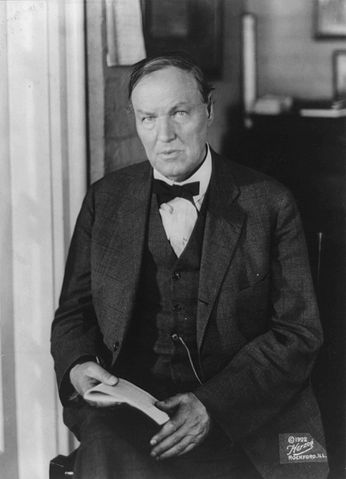
A strange feature of Frank E. Allen’s Evolution in the Balances (1926), which I have discussed here at the Science League of America before (here and here), is the clash in the introduction of a discussion of the meaning of “evolution” with a passage from the chief justice of the Ohio Supreme Court. On p. 14, Allen writes, “There is a great deal of confusion as to the meaning of evolution,” and gives a series of definitions. He ends by quoting “[a] professor of physiology, at the head of that department in a university known to the writer,” who attests that ninety-five percent of his colleagues understand evolution to mean not simply change within a species but “the development of life all the way up to, and including[,] man.” In the next paragraph, he adds that those who think that evolution means change within a species “are not using it in the generally accepted scientific sense.” So it seems that Allen regards evolution as including the thesis that humans share their ancestry with the rest of life.
But on p. 13, Allen approvingly quotes C. T. Marshall—that’s Carrington T. Marshall (1869–1958), who served as the chief justice of the Ohio Supreme Court from 1921 to 1932, and briefly, in 1947, as a judge in the Nuremberg trials—as castigating Clarence Darrow (above) for unethical behavior at the Scopes trial.
Neither the indictment nor the statute under which the indictment was framed contained any mention of evolution, neither did they in the remotest degree involve or necessarily provoke any discussion of the theory of evolution. The Tennessee statute provides that it shall be unlawful for any teacher in any public school of the state to teach any theory that man has descended from a lower order of animals. That the forbidden doctrines were so taught was freely admitted by the defendant. No defense was therefore open except that of the constitutional validity of the law. And yet Darrow sought to browbeat and to bluff the judge into admitting expert evidence upon the soundness of the theory of evolution.
So according to Marshall, and by extension Allen, the Scopes trial wasn’t about evolution. No source is provided by Allen, but he is apparently quoting a contemporary Associated Press report of Marshall’s address in August 1925—after the close of the Scopes trial—to a class of law students in Cleveland.
If, as Allen acknowledges, evolution (in its “generally accepted scientific sense”) includes the thesis that humans share their ancestry with the rest of life, then it’s odd for him to endorse the idea that evolution wasn’t relevant to the Scopes case. There’s really no explanation of the clash to be found in Evolution in the Balances, and it’s hard to avoid the conclusion that Allen included the quotation from Marshall simply as a vivid and authoritative disparagement of Darrow. Of the other lawyers defending Scopes during the trial in Dayton—John Neal, Dudley Field Malone, and Arthur Garfield Hays—there is no mention. It isn’t particularly surprising: then as now, Darrow was the most famous, and the most notorious, of Scopes’s legal team. Plus his harsh interrogation of Bryan was offputting, the more so when Bryan died shortly after the trial. Scopes himself commented that in Dayton, “there was a rumor about town that ‘that old devil Darrow’ had killed Bryan with his inquisition.”
Darrow responded to Marshall, as both Ray Ginger in Six Days or Forever? (1958) and L. Sprague de Camp in The Great Monkey Trial (1968) observe, in the August 29, 1925, issue of The New York Times. “Judge Marshall would have done well to read at least the caption of the Tennessee law, before basing a speech on it,” he told the Times, observing that the caption read, “An act to prevent the teaching of evolution in the public schools.” (Not quite: “An act prohibiting the teaching of the Evolution Theory in all the Universities, Normals, and all other public schools of Tennessee…” But close enough.) Zing! That response was devastating enough, but Darrow “reread the words of the Justice closely and smiled.” Drawing attention to Marshall’s complaint about his ethics, he noted that the case was still sub judice, under appeal to the Supreme Court of Tennessee, and rhetorically asked, “What about the ethics of the Chief Justice of another State giving his opinion on the case when he obviously knows nothing about it?” Again, zing!
I don’t see any indication that Marshall ever reiterated, qualified, or retracted his accusations against Darrow, but I imagine that neither man held a grudge. For a few years later, in 1928, when Darrow debated Rabbi Barnett R. Brickner (1892–1958) on the subject “Is Man a Machine?” in Cleveland, to a standing-room-only crowd and a radio audience of half a million, Chief Justice Marshall moderated. Presumably, despite his relish for public debate, Darrow would have declined to participate in a debate supervised by a moderator who he thought would be unfair to him. Marshall, for his part, introduced (PDF) the debaters as “two great mental giants,” describing Darrow as a lawyer “of world reputation.” He added, “his real reputation has been acquired as a representative of the oppressed and the downtrodden.” As a conscientious moderator, Marshall expressed no view about the winner of the debate. According to the on-line Encyclopedia of Cleveland History, both the audience and four unofficial judges gave the nod to Brickner.

